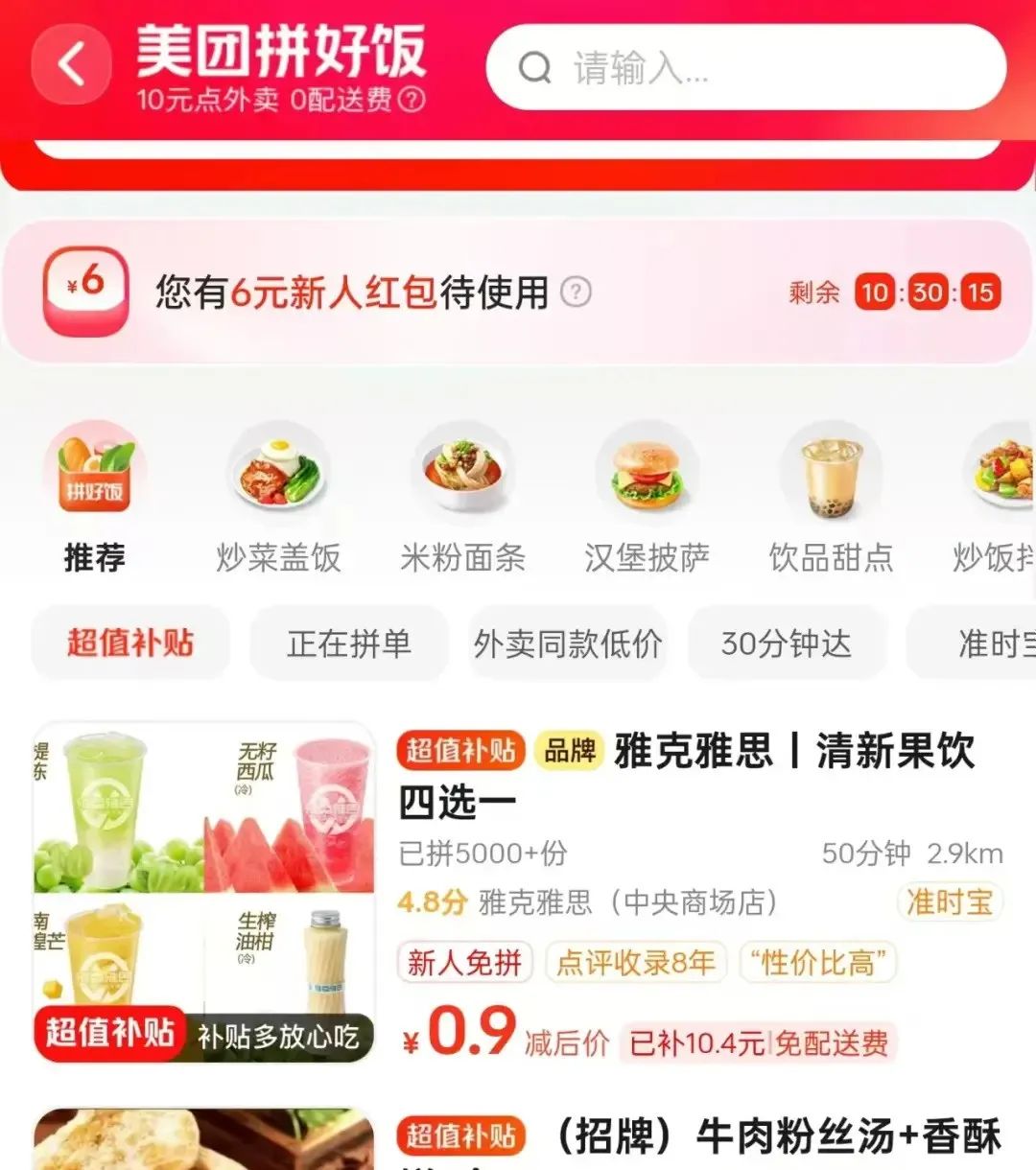Counterattacking Douyin, Meituan Wins the First Half
![]() 09/06 2024
09/06 2024
![]() 599
599

The strength of instant retail determines the width of Meituan's moat.
Meituan breathes a sigh of relief!
After being relentlessly pursued by Douyin for several blocks, Meituan released its second-quarter and half-year financial report for 2024 on August 28. The second-quarter revenue was 82.3 billion yuan, exceeding market expectations of 80.4 billion yuan, with a year-on-year growth of 21%. Adjusted profit was 13.6 billion yuan, exceeding market expectations of 10.6 billion yuan, with a year-on-year increase of 77%.
From a revenue and profit perspective, Meituan can be said to have a double celebration. After setting a new quarterly high since its listing, market confidence in Meituan has further improved. In contrast, pursuers like Douyin, after clarifying their profit-first strategy, seem to have slowed down their offensive pace into Meituan's core market.
This result is a testament to Meituan's continuous efforts to fortify its moat. In a sense, Meituan has always been defensive while maintaining an offensive stance.
01 Challenge of Instant Retail: High Delivery Costs

Meituan's long-awaited inflection point in profitability has arrived, primarily driven by commissions and online marketing. However, from a broader perspective, instant retail is undoubtedly set to become Meituan's next major battleground.
Instant retail is the next super growth pole in the overall e-commerce retail market, and this business can be seen as a vertical extension of Meituan's delivery services. Logically, Meituan stands to gain significant revenue from this segment, and the data seems to support this view: In the second quarter, Meituan's delivery service revenue from takeout and flash sales reached 23 billion yuan, up 12.7% year-on-year. During the same period, Meituan's total instant delivery orders amounted to approximately 6.2 billion, a year-on-year increase of 14.2%.
However, the reality may be more complex than the data suggests. The biggest challenge facing Meituan is that its delivery business is a money-losing venture. In the first half of 2024, Meituan's delivery-related costs amounted to 108.96% of its delivery service revenue. This is despite Meituan's vast network of over 8 million registered delivery personnel, which generates significant cost economies of scale.
However, the scale of instant retail orders is still significantly smaller than Meituan's traditional delivery business. To mitigate the loss of nearly 10% per delivery, Meituan relies on traffic marketing. Leveraging the traffic generated by its vast army of riders and combining it with Meituan's big data marketing advantages, the company continuously empowers merchants, making it a potent weapon in breaking through the instant retail market.
With a combination of marketing services and commissions, delivery-related costs account for only 30.89% of Meituan's total revenue, showcasing its multi-faceted approach to profitability.
The China Chain Store & Franchise Association predicts that the market size related to instant retail will exceed 1 trillion yuan by 2024. The large and continuously growing instant retail market is undoubtedly attractive. However, unlike traditional businesses, instant retail places significant emphasis on fulfillment services, which is the most prominent feature among all delivery services. Focusing on this aspect means that Meituan will face formidable competitors.
Consider the logistics giant SF Express. According to its financial report, in the first half of 2024, SF Express's non-meal delivery revenue increased by 32% year-on-year to 1.67 billion yuan. It also recorded high double-digit growth in key service scenarios such as supermarkets, convenience stores, pharmacies, and cosmetics.
Although SF Express, as a third-party delivery service platform, does not have a deep presence in the local lifestyle sector, its years of experience in logistics channel construction is an advantage that Internet platform giants cannot match. More importantly, SF Express's role is different from that of local lifestyle giants. Even though it does not generate its own traffic, it can absorb and process traffic from various sources, including Douyin, WeChat, and Alibaba. Even Meituan itself has partnered with SF Express for instant retail delivery, demonstrating the latter's formidable capabilities in this market.
SF Express's rapid growth naturally intersects with Meituan's core market, including supermarkets, convenience stores, pharmacies, and cosmetics. Given the growth of the market size and the business layouts of competitors, Meituan has incorporated more categories into its flash sales business, replicating the food delivery model.
Currently, Meituan's flash sales order growth rate is more than three times that of food delivery. Industry order growth rates are also expected to soar in the coming year. According to internal estimates, if Meituan captures the instant retail orders, it could exceed 100 million daily orders during peak seasons next year. This vision undoubtedly drives Meituan to fortify its instant retail moat.
02 The Impact of Penetrating Lower-tier Markets: Breakthrough with Low Prices

The diminishing Internet dividends are a consensus across the industry, but Meituan still has aspirations in the local lifestyle sector.
According to QuestMobile data, in 2023, the penetration rate of group-buying in the local lifestyle services sector was less than 40%, while that of food delivery was 15.6%. On the other hand, some institutions estimate that the market size of local lifestyle services will grow from 19 trillion yuan in 2021 to 35.3 trillion yuan in 2025, with online penetration increasing to 30.8%.
It is evident who will benefit from this market expansion, but a crucial question arises: Where exactly is this market?
In China, it has long been believed that to succeed in business, one must capture the mega-cities like Beijing, Shanghai, Guangzhou, and Shenzhen. However, this notion was upended by the emergence of Pinduoduo, which leveraged low prices and the untapped potential of lower-tier markets to achieve remarkable success.
Similarly, Wang Xing, the founder of Meituan, has set his sights on these markets.
According to reports, nearly one-third of Meituan's earnings call focused on low prices, high frequency, and penetration rates. This underscores Meituan's commitment to the lower-tier markets.
Indeed, there is a rationale behind Meituan's aspirations. Media estimates suggest that the core user group capable of affording frequent instant delivery services should have a monthly income of at least 5,120-6,700 yuan. In 2019, it was estimated that approximately 228 million working-age Chinese had a monthly income exceeding 3,000 yuan. Therefore, while Meituan boasts nearly 700 million users, its core user base numbers only around 100 million and is heavily concentrated in mega-cities. This user structure is unlikely to expand significantly.
Moreover, economic pressures have reshaped the market landscape. In July, retail sales of consumer goods grew by 2.7% year-on-year, but the growth rate of catering revenue slowed to 3.0%, the lowest since March 2023. Notably, catering markets in mega-cities like Beijing and Shanghai have declined, with Beijing's catering profits plummeting to just 0.37%.
Amid the economic downturn in mega-cities, an unusual trend emerged in employment data. In 2023, the proportion of fresh graduates employed in third-tier and lower-tier cities increased significantly. Notably, the employment rate of vocational colleges in cities below the third tier (56.3%) was even higher than that of regular universities (44.7% for first-tier and 42.3% for second-tier).
Evidently, economic vitality lies in the lower-tier markets, yet Meituan faces a paradox: consumers in these markets are price-sensitive, yet the company is eager to enter quickly. Consequently, Meituan has adopted a low-price strategy, forging a path similar to that of a decade ago.

To penetrate lower-tier markets, Meituan has leveraged various tactics, including low-cost ground promotions, community group buying, elevator media advertising, and partnerships with Kuaishou. Among these, Pinhaofan has garnered the most attention.
Meituan piloted its Pinhaofan business in 2020, positioning it as a low-cost takeout option for lower-tier markets. In the fourth quarter of 2021, the average check size for Meituan's food delivery service was approximately 50 yuan, while Pinhaofan offered meals priced below 15 yuan. Pinhaofan's positioning resonated well with lower-tier markets, and its popularity soared after expanding to first- and second-tier cities like Beijing, Shanghai, Shenzhen, and Chengdu in 2023. With 1.16 billion orders in 2023, accounting for 6% of Meituan's total food delivery orders, Pinhaofan has established itself as a low-price barrier in the catering sector.
Pinhaofan's success echoes that of Pinduoduo, leveraging the untapped potential of lower-tier markets to encircle major cities. However, some have questioned whether Pinhaofan merely downgraded existing Meituan takeout orders, thereby increasing market penetration in lower-tier markets at the expense of average order value.
Confronted with this criticism, it's worth considering the broader context: In today's consumer landscape, even if Meituan had not introduced Pinhaofan, it's likely that Ele.me would have done something similar. Amid the zero-sum game between Internet giants, Meituan has taken a more decisive step into lower-tier markets.
03 Confronting Douyin: The Rise of Live Streaming Business

When describing the competitiveness of its sector, Meituan notes that "whenever a competitor enters the local lifestyle services market, they tend to start with on-site services."
Douyin is a prime example. In September 2018, Douyin introduced its POI aggregation page, followed by its group-buying business in March 2020. By 2022, Douyin's local lifestyle services GMV approached 60 billion yuan, with a year-on-year growth rate of 256% in 2023. KOL-driven group-buying GMV alone approached 100 billion yuan, with some reports estimating the overall GMV to be as high as 150 billion yuan, while others claimed Douyin's internal target was 400 billion yuan.
Clearly, Meituan faces a formidable rival. Douyin's rapid growth in local lifestyle services is largely attributed to its low-price strategy, which includes special discounts, fan subsidies, and merchant subsidies. As a result, Douyin's local lifestyle business has expanded rapidly. In 2023, users searched for local lifestyle-related content 59.3 billion times, with search-driven transaction growth tripling and daily search volume increasing by 157%.

Douyin's expansion strategy mirrors that employed by Meituan in its early days. In response, Meituan chose to fight fire with fire. In late 2022, Meituan ventured into the restaurant exploration sector, launching the WeChat mini-program "Meituan Circle Restaurant Exploration" to facilitate connections between merchants and KOLs. Similar to Douyin's approach, Meituan subsequently introduced live streaming by KOLs and partnered with local MCN companies on a large scale, offering subsidies of up to 6,000 yuan per account for agencies with over 100 accounts. As a result, Meituan's live streaming performance soared, with monthly GMV reaching 5-6 billion yuan in July 2023, a 20% month-on-month increase. In August, GMV climbed to 10-12 billion yuan, with several live streams exceeding 100 million yuan in sales. By October, monthly GMV surpassed 2 billion yuan.
Starting from the second quarter of this year, Meituan gradually reduced its merchant deductions, with some catering merchants seeing deductions drop from 8% to 4%, and some even enjoying full deductions, with Meituan only charging basic service fees. These measures are part of Meituan's ongoing defense against Douyin's incursions. Logically, Meituan's heavier investment in delivery assets positions it as a gateway to offline traffic, allowing it to reduce service fees while maintaining a healthy revenue system. As a latecomer, Douyin enjoys significant advantages in interest-based e-commerce but lacks the infrastructure to match Meituan's delivery network, which Meituan is leveraging to its advantage.
After years of Exploring , Douyin took the initiative to make changes in the first quarter, announcing its focus on profitability, effectively putting its money-burning strategy on hold. As Douyin increased commissions for hotel and travel bookings, causing dissatisfaction among merchants, the discomfort of long-term high-income inertia became evident, which was a sigh of relief for Meituan.
However, facing a formidable rival like Douyin, the longer Meituan rests, the higher the cost may be.







